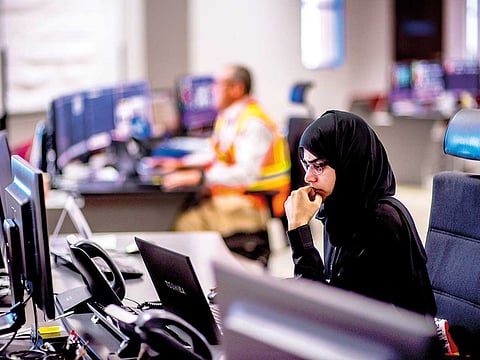Meet UAE’s first Emirati heavy train controller
Controlling freight trains and ensuring safe rail network operations are all a day’s work

Abu Dhabi: She is breaking new ground as she plays a vital role in ensuring the UAE’s national railway network runs smoothly. As the first Emirati heavy train controller, Maithaa Al Rumaithi’s double distinction is a matter of pride for her.
“I have an engineering background, and I wanted to work in a practical role rather than in a theoretical one. I was never interested in arts or humanities. From the beginning, I knew that I would go on to work in a space that demanded a hands-on approach,” Al Rumaithi told Gulf News, explaining her motivation to join Etihad Rail DB.
She has been with Eithad Rail DB for six months now, and her daily tasks entail several different and challenging aspects.
“As a train controller at Etihad Rail DB, my responsibilities range from monitoring all safety-related operations to identifying and solving critical technicalities,” said Al Rumaithi.
“I am responsible for the safe operation of four commercial trains per day. These comprise two fully loaded trains and two empty trains. I also have the responsibility to plan the access to the railway for three on-track vehicles each day which perform essential safety checks,” Al Rumaithi explained.
I like to think that my success … will mark the beginning of a new chapter for Emiratisation, for women in particular.

“There are also many engineering trains that require daily access to the railway network to perform essential maintenance; I plan these activities in between drawing up the schedule for commercial train runs, to ensure minimal impact on them,” she added.
With 21,000 tonnes of cargo being transported by the trains, Al Rumaithi says there’s no room for error in operations.
“Our two trains run from Shah and Habshan Loading Terminals to Ruwais to offload cargo on to waiting ships. The empty trains then return from Ruwais to our depot at Mirfa in preparation for their next journey to the production terminals at Shah and Habshan.
“The trains currently transport granulated sulphur, which is a by-product produced during the gas production process at Shah and Habshan,” she added.
Trained to handle emergencies, Al Rumaithi says each day demands a state of full preparedness. “Each day, I have to be ready to deal with any situation that may arise. Every incoming telephone call could potentially be an emergency call. A big part of my job role is having the capability to remain calm in all situations.”
Her confidence in her abilities, a trait she honed over the last 11 months, has helped her immensely, she says. “My knowledge and confidence has been underpinned by the excellent training provided by our accredited professional training department at Etihad Rail DB,” she added.
One of key attributes of the role of a train controller, she says, is that she is always the lead communicator. “Which means that I must always ensure that every telephone call or message is repeated back to the caller and is understood by us both. The reason being, I have to perform critical safety tasks which, if not clearly communicated, could cause injury or damage to the railway,” says Al Rumaithi.
Empowering women
Al Rumaithi says she hopes to be the first of many Emirati women to join the national rail sector, highlighting how more and more young Emiratis were looking for careers in new fields to help further develop their country.
“I believe that I represent an increasing percentage of Emiratis looking to explore their future in the rail industry, among other civil services, and to apply their skills serving the nation.
“I like to think that my success as a railway industry outsider will mark the beginning of a new chapter for Emiratisation, for women in particular,” she added.
But in order for more women to join, Al Rumaithi said the industry needs to support and encourage women to sign up and create opportunities for them.
“While developing a highly skilled home-grown workforce for the railway business is a massive undertaking, encouraging women to get a seat at the table in a predominantly male-dominated industry is a whole different story,” she said.
“According to figures revealed by the Ministry of Human Resources and Emiratisation database in 2017, female nationals in the UAE accounted for more than 80 per cent of active jobseekers in civil services. The eye-opening numbers inform the growing need to support and uplift promising talent in the region,” she added.
“Specifically, this means creating a culture of recognising and rewarding local talent for crucial jobs that have traditionally been reserved for men and expatriates,” she said.
She is confident of a more diversified workplace because of her own experience as well as due to Etihad Rail DB’s willingness to employ more women.
“While the journey to diversity in the workplace has been a gradual one, I am confident about the future. I’m proud to be part of the company and to be an Emirati woman working for an organisation that’s building this dynamic railway industry in the UAE from the ground up.”
Regarding her future, Al Rumaithi hopes to become a key decision maker for the company one day.
“I want to continue being an active member in this company in operations and eventually join the ranks of the key decision-makers.”
Sign up for the Daily Briefing
Get the latest news and updates straight to your inbox



